Your Planets
Portraits of the Planets
Aspects between Planets
The planetary ages
The planetary families
Planets in Signs
The Planets in comics
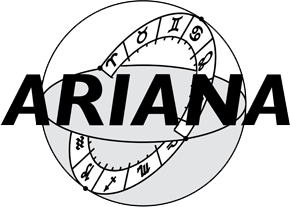

To approach the Neptunian stage is necessarily to speak of the duration of life. How many years of existence does each individual have from the moment of their birth? Only one extra-lucid seer-demiurge could answer this question. In any case, astrology is incapable of this: the date of death is not determined by the cycles and rhythms of the planets of the solar system. On the other hand, at the collective level, the average length of life can be statistically determined: this is called life expectancy. This concept incorporates all the parameters that contribute to increasing or decreasing longevity.
Currently, life expectancy is around 75 to 80 years in Europe and North America but does not exceed forty-five years for the poorest African countries. It has not always been so: the average lifespan also varies according to the times. Until the XVIIIth century, it was about thirty years maximum on all continents: times were hard, numerous and deadly famines, very high infant mortality (one child in four), omnipresent poverty and deplorable sanitary conditions aggravated the effects of countless epidemics. At the beginning of the XXth century, it did not exceed forty-five years in the industrialized countries. This shows the progress that has been made in this area in a very short period of time.


At the end of the XXth century, it is estimated that approximately one individual in two million would reach the venerable age of one hundred and fifteen years. In France, there were only two hundred centenarians in 1953 and six thousand are expected by the year 2000. Suffice to say that gerontology is a brand new science and that, contrary to the immense progress that has been made since the beginning of the XXth century in our knowledge of childhood and adolescence, we know little about the positive or negative effects of aging. Studying these effects also poses a major problem: it is necessary to distinguish between those of primary old age, which lead for everyone to a reduction in the efficiency of many vital and intellectual functions, and those of secondary old age, essentially due to worsening of chronic illnesses and other previous traumas. This distinction is difficult since there is an interaction between primary and secondary old age: the decline in vitality “normal” old age promotes the aggravation of old pathologies that are not directly attributable to old age.
The confusion between primary and secondary old age leads most of us to consider this final stage of life only from its pathological, sickly and, to be frank, negative angle. And yet there are happy and balanced old people: those who, combining a vigorous genetic heritage and the chance to have lived in favorable historical and socio-economic conditions, have also known how to organize themselves personally against the disease. These are obviously a minority: life is a game of goose, an obstacle course that does not give a gift. But provided that sanitary conditions continue to improve and that the effects of pollution do not reverse these medical advances, these flourishing old men may represent the prototype of what a “primary old age” ideally experienced: personal wisdom, long-term awareness and sense of universal values…
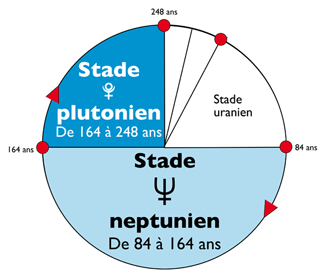
Beyond eighty-four years, in this stage of life governed by planet Neptune, we are no longer just old: we are becoming very old. If the individual has escaped death during the previous stage, he can no longer hope to see the deadline postponed for very long: every hour is counted for him. If he still has projects, he can only reasonably place them in the very short term. As for his individual ambitions and his role in social competition, they are now behind him. You don’t start a new career at that age. At the age of one hundred, we have seen almost all of our friends or colleagues disappear, and very probably the companion or companion of a lifetime. At over a hundred years old, one is at least a great-grandparent, and more often a great-great-grandparent: five generations have passed and reproduced.
If we had consciously or unconsciously neglected this fundamental dimension of life before, we can no longer ignore it from now on: death is no longer a prognosis, certainly dark and distressing, but sufficiently distant in time to be forget. She is physically close, almost palpable. At the twilight of his existence, this proximity to death reminds the individual that the laws of the species are unavoidable, inescapable. The individual must die for the human species to survive: it is estimated that eighty billion men have lived on Earth from the beginning to the present day. Our little blue planet cannot meet the needs of such a large number of people. Besides, Nature makes fun of individuals: after having broken down their bodies into simple organic constituents, she tirelessly reintegrates them into the chemical cycles of the biosphere. Without regard for the thoughts, hopes, regrets or moods of individuals, Nature only knows and practices the mysterious laws of large numbers, communities, collectivities. One being leaves, another takes its place. That’s life.
The dead are about sixteen times more numerous than the living. There will always be more dead than alive: it is inevitable. At a hundred years old and over, man can no longer ignore that life is immersed in death, and that his brave individual existence is only a tiny moment in the history of the human species and, more broadly, of the universe. Lived positively, the Neptunian stage invites us to drop our individual blinders, our personal points of view, and encourages us to widen our field of consciousness: the feeling of belonging to humanity and to mysterious Nature is more important than anything. Death shaves off individual particularisms: we are all equal before it. Rich or poor, black or white, male or female, dominant or dominated, it makes no distinctions: all belong to a hidden, transcendent, invisible dimension. Living and non-living are united.
Positively, this perception of the world authorized by the Neptunian stage (and more broadly the neptunian function) can only make you humble and tolerant. To hell with the intellectual certainties, the social vanities, the prejudices of an era: at the end of a life spanning five generations, we had time to measure their relative importance. We feel human above all else. From there to developing a deep humanism, there is only one step that a number of “neptunians” do not hesitate to cross. The individual does not count, only the human community of which we are a temporary incarnation, a united, living and active cell matters. Negatively experienced, this same perception is obviously extremely destabilizing for the individual ego if it does not want to let go. The law of the species then takes on the face of an unjust and obscure fatality against which nothing can be done: the individual, not supporting the prospect of his disappearance while knowing that it is unavoidable, then let himself go completely. Active deindividuation, which opens the being to its collective dimension, is transformed into passive depersonalization. The old man gives up, resigns. His intellectual vigilance is atrophied, his lucid conscience is at half mast. What good is it to live, since it is to die? And yet, instinct still pushes him to cling to life at all costs. even if it is insane, even if he has lost all reference point, all illusion, he still clings to the last one: still surviving.
Survive. Is it the body which, by animally refusing death, calls for a hypothetical survival of the soul? Or is it the soul that refuses to consider itself mortal? At the Neptunian stage in any case, within the general slowing down of the physical faculties, we are forced to confront these metaphysical questions. What is life? Is it reduced to earthly existence, or is the latter only one manifestation among others? Where is the life? What we experienced, this fleeting spectacle on which the curtain will soon fall, is that really it, or was it all just a mirage, a dream, an illusion that we went through in a a state of somnambulism which one took for consciousness? As stillness wins over movement, as cold settles in his bones and death tightens its grip, one who has passed the age of one hundred cannot help but wonder if he has really lived, if that was really life.
We die to life, is it to live death? Or to survive “To life, to death” ? The great old man often has the impression of having always been an emigrant from existence, of having existed only on the margins, by breaking and entering. Between the dreams he had, the lives he imagined and the life he led, what a terrible discrepancy! To believe that life, the real one, is not just lived existence, but something vast, broader, deeper, of which lived existence would be only a stammering, an outline, a timid emergence. So many virtualities reduced to so few achievements! It is to wonder if existence would not be “a fable told by an idiot, a fable full of noise and anger, and meaning nothing”, as Shakespeare wrote.
There is no sure, certain, definitive, rational answer to this question. As long as we haven’t gone to the other side of the mirror, we don’t know, and afterwards… we never know. To answer it all the same, because man needs answers, even partial, even ambiguous, even incredible, only faith, intuition, the uncertain wager, the irrational certainty that is perhaps not than the ultimate mystification. On the green carpet of the beyond, the temptation is strong to bet big: and why not reincarnation, glorious bodies, resurrection? Everything, rather than not surviving. “What if I don’t die? If I was miraculously the first being in the world not to die?” Difficult to accept day after day that we only live on borrowed time, that we are a potential death. We prefer to tell ourselves stories rather than accept the terrible reality of dying. Those with a strong and dominant Neptune in their birth chart are often good at tricking themselves and others into believing fables that are often just the parallel lives they believe they are. live at the same time as their life “real”. People “normal” will then say that they are fantasizing, that they take their desires for lived transcendence for realities.
The physical proximity to the afterlife, of which the act of dying is only the gateway, inspires different attitudes in others. If life has a discreet, hidden and deep meaning that goes beyond our small and ephemeral existences on all sides, then the old man over a hundred years old is at the forefront to touch this meaning, to live it in his flesh, to discover it. as in itself, devoid of any explanatory make-up. Mysticism then extends its helping arms to him: his life will have been only the provisional and transitory expression of the will for an elsewhere. It can be called God or the Divine, or else Being, or even Destiny. It is in any case a transcendental, incredible and unverifiable entity of which the old man can say to himself, at the twilight of his life, that he has perhaps subtly, occultly but effectively determined his course by giving it a meaning difficult to determine with sharpness. It doesn’t matter: at this stage, some can only believe in another part, another thing, an elsewhere, another life. The content that the individual gives to this empty container that is the Neptunian function is then called faith.
The most hardened and recalcitrant skeptics of any type of belief, those who refuse until their last breath to say “once upon a time”, will experience this Neptunian stage in a different way. It will then be a bit “live happily while waiting for death”, as Pierre Desproges said, born under a dominant Neptune and died long before reaching his Neptunian stage (like there is no age to be a Neptunian…). From this other metaphysical point of view, those who are in good health will conscientiously and philosophically enjoy each passing moment of life, living it all the more intensely because they know full well that it may be the last, that it is is a unique moment in life that should not be missed. The most sensual will then find a taste of “come back” so delectable that it would almost make them doubt the annihilation they see in death. Those whose ill health makes existence more difficult but who cannot resolve to die slowly will suffer, on the other hand, from being forced to experience painful or painful sensations at all times, which are nevertheless the ultimate sensory guideline that still connects them to life. How many great old people seem to fall into masochism by refusing to leave an existence that is nevertheless trying, when deep down they only want to enjoy until the last moment the feeling of being alive?
Nothing is perhaps more beautiful than a sunrise over the sea, than the caress of a skin, than a good glass of wine, than a warm encounter when you know that these may be the last, as if it were necessary before dying to extract all its juice from life, down to the last drop, so that nothing, neither pleasure nor suffering, is lost in the ocean of nothingness. There are many mystics of hedonism among those in whom Neptune rules at birth…
The time of more than a century is in any case a time of loneliness and interior or exterior isolation. Social life is reduced, rarefied, condensed. More professional relationships. The privileged relationships, friendships and loves of yesteryear no longer exist, except for couples or groups that live for more than a hundred years. Death for the most part took them away. The older we get, and the more life is strewn with absences, the more it seems that life is what survives in spite of everything among absences, the more it seems plausible that life is only the expression of an inextricable tangle of d innumerable presences and absences. At the Neptunian stage, we are not there to show off anyway, to seek applause: we may no longer be there when we hear them. It is no longer a question of playing one’s role (for whom? Why?) in society, but of being oneself, with one’s ambiguities, one’s uncertainties, one’s long memory, one’s unfulfilled desires, one’s regrets which one believes to be eternal, his hopes whose relativity we measure and perhaps with his faith which still allows us to hope for everything…
His social and physical activities being reduced to their strict minimum and often to less, the great old man is most often forced to face himself. He contemplates his existence of which he thought he was the actor and of which he is now only the spectator, but of which he knows that he is nevertheless still the active incarnation: he has not yet left the stage. Troubled feeling. He already feels outside, and he is still inside, and all those around him believe him still here, when he is already somewhere else without really being there… To observe him, we think he is absent, whereas it is infinitely present, through another perception of the world. We imagine that he no longer communicates while he communicates his quiet but heavy presence. He is there without appearing to be. It still exists. It is there, barely, but it is there, like a witness to a distant world, a living trace of the engulfed past or of the future that awaits us, like a fossil whose heart still beats, like a tremor coming from the depths of the life that children sense and adults prefer to ignore.
This de facto incommunicability promotes inner life, withdrawal into introspection. Each attitude, each gesture, each act can only come from the depths of oneself. In everything we do, we can no longer do otherwise than invest all that we are, that is to say all that we have become, given that we have no no more time to become something other than what we were and remain. We then do things as we feel at the time, unconsciously taking into account a vast experience which is in fact inexpressible. When one is very very old, one sinks into a frightful chaos or into an immemorial wisdom. In any case, we have the impression of being able to touch the deepest dimension of life, the one that precisely escapes young people…
This dimension, if it is shareable, is not negotiable. It is personal and deep. She is metaphysical. The tall old man can only observe that he is what he is and vaguely perceive that he could have been someone else in other circumstances, knowing very well that he could not be seen otherwise. the circumstances he went through. Paradox… and fundamental question: “Is the existence that I have lived in harmony with the being that I am?” If the answer is yes, he has the satisfaction of having been deeply himself in what he experienced. If the answer is no, it is too late to change and there is no going back. There too, there can be a tendency to abandon, to let go, to the irresponsibility of what is commonly called the “back to childhood” many old people: regardless of the problems posed by senility, they have no deep reason to assume themselves, to assume an existence to which they feel, deep down, already foreign.
There are different types of memory: a distinction is made between short-term memory or immediate memory, which makes it possible to quickly receive information and temporarily encode it in the brain, and long-term memory, which concerns deep memory traces, memories that we don’t forget. On another level, we can also distinguish three specific levels of memory: social memory, which stores everything that is useful for life in society: language, codes, rules, conventions; sensory-motor memory which records sensations, movements, concrete experiences; and finally autistic memory, which is the most fuzzy and complex.
Word “autistic” comes from Greek car, which means “oneself”. Autistic memory differs from others in that it confuses memories and mixes eras: “As a general rule, dreams (or delirium) reproduce only fragments of the past, and these fragments it recomposes according to its own genius. The flow of autistic memory carries ready-made automatisms borrowed from sensory-motor memory and fragments dissociated from social memory, but it unites them and leads them where it wants, according to the demands of its internal logic which obeys the laws of unconscious dynamism [1].”
The tall old man has memory problems. While short-term memory loses its reliability and precision, long-term memory, boosted by its long years of life, encourages it to dwell on the past. This phenomenon can take on a pathological dimension when dreams, delusions, confused aspirations mix with the precise memory of facts: autistic memory, by dominating its behavior, undermines its social memory (communication problems) and its sensory memory-motive (irrational actions).
But this extension of the role of autistic memory in the great old man does not only have faults. It also allows him to freely recompose his existence in a personal way and perhaps to find in it a deep coherence that strict respect for facts and chronology cannot achieve. This coherence which seems delirious remains most of the time for internal use. Those around him will only see delusions and wanderings where the old man unconsciously reassembles the mosaic of his memories in the way that suits him. Positively, autistic memory makes it possible to make strange connections between apparently unrelated phenomena, to associate events which seem to have no common point. Geniuses and discoverers do not proceed otherwise…
At worst, therefore, the Neptunian stage favors amalgams, confusions, smoky extrapolations, perceptual and interpretative delusions. At best, it allows the emergence of deep memory, the one that belongs only to oneself, the least standardized, the least conventional, the most creative, the least predictable too, because the thought processes that it puts implemented are irrational, intuitive, at odds with formal logic. The imaginary commands and invents things that do not exist but of which it senses the possible existence. Physicist Werner Heisenberg, born under a ruling Neptune, said of the physical world that “Things do not exist, but they tend to exist”. With the Neptunian function, the imaginary can give birth to strange and mysterious realities as well as the most absurd delusions. The old man, freed from the constraints of social memory, no longer feels obliged to respect common logic and to think like the others. While the “neptunians” the less gifted sink into confusion and the chimeras, the most gifted, who do not need to reach a hundred years to mix their memories, are thus characterized by an original and paradoxical thought, an extraordinary experience that defies the rules ordinary.
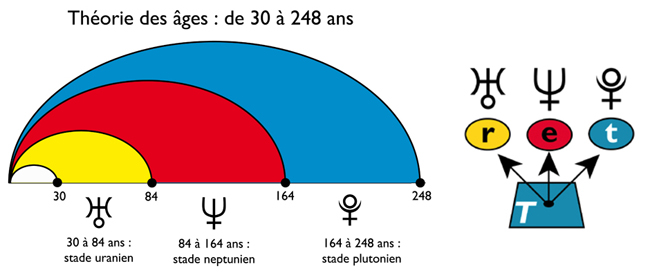

We are in neptunian state, like the great old man or the “dead” from 84 to 164 years old, when we feel strange sensations, when we seem to touch a mystery, when we feel crossed by incomprehensible emotions that upset us without our knowing their origin, when we have the impression of perceiving the imperceptible, feeling the impalpable, seeing the invisible. We are in a Neptunian state when in our actions we feel guided by something which is both within us and completely beyond us, when we act on the faith of an inexplicable but pressing presentiment, of an unverifiable but imperious intuition. We are in a Neptunian state when our unconscious dictates the way forward, when we feel invaded by deep aspirations, as powerful as they are imprecise, which ask us to exist on a plane other than that of the obvious, to fill our experience with all the depth of our being.
We are still in a Neptunian state when we are ambiguous, ambivalent, uncertain, undecided, when we don’t really know what motivates us, when we want something very badly without really knowing what exactly. We are in a Neptunian state when we walk by feeling, when we make half-goat, half-cabbage decisions, when we let our “pifometer” to evaluate beings, things and situations, when we trust our “little finger” than conventional logic. We are in a Neptunian state when we allow our imagination to unfold amply, when we have moods, when we feel crossed by surges of euphoria or depression that apparently nothing justifies. We are in a Neptunian state when we powerfully feel that something invisible is acting insidiously within us without our being able to name or define it.
We are always in a Neptunian state when we feel intensely that our individual existence has deep meaning only through its belonging to the human collectivity, when we have the impression of belonging to a vast whole, when we place the deep perception of what is the human above any spirit of system. We are in a Neptunian state when we have faith in another present of the world, when we know that the moving and mysterious dynamics of beings cannot be confined to any category whatsoever, when we emotionally adhere to great causes without worrying to understand them, when we feel inhabited by a multitude of beings, as if each of us were above all an individual incarnation of the great collective body.
We are finally in a Neptunian state when we are utopians, when we harbor wild hopes, when we draw imprecise and improbable plans on the comet, when we advance in life haphazardly, without precise objective, without conquering will, convinced that deep down we are the playthings of circumstances and that it would be futile to want to thwart them, when we feel ourselves to be elsewhere while still being here.
It is difficult to precisely describe those in whom Neptune is strong and dominant in their birth chart. Ambiguous, paradoxical, complex and at the same time human, moving, they walk on instinct, according to their moods, often have unpredictable behaviors and semi-conscious ambitions that come true in strange contexts. If Neptune is weak, the individual has a very strong tendency to neglect, to repress, or to deny his inspirations, his intuitions, his presentiments, to disregard his deep aspirations, to cut himself off from his sources of inspiration. innermost.
▶ The Neptunian: Psychological profile
▶ The neptunian function ‘eT’ (existence of Transcendence)
▶ Uranian stage (from 30 to 84 years old): the age of individualization
▶ Uranus-Neptune-Pluto: extensive Transcendence
▶ Venus-Mars-Neptune: intensive existence
▶ Introduction to the Theory of Planetary Ages
▶ L’échéancier planétaire et la Théorie des âges
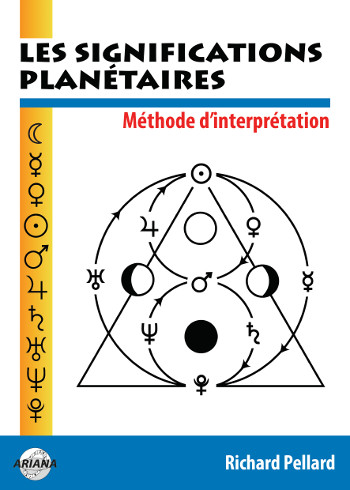
Les significations planétaires
par
620 pages. Illustrations en couleur.
La décision de ne traiter dans ce livre que des significations planétaires ne repose pas sur une sous-estimation du rôle des Signes du zodiaque et des Maisons. Le traditionnel trio Planètes-Zodiaque-Maisons est en effet l’expression d’une structure qui classe ces trois plans selon leur ordre de préséance et dans ce triptyque hiérarchisé, les Planètes occupent le premier rang.
La première partie de ce livre rassemble donc, sous une forme abondamment illustrée de schémas pédagogiques et tableaux explicatifs, une édition originale revue, augmentée et actualisée des textes consacrés aux significations planétaires telles qu’elles ont été définies par l’astrologie conditionaliste et une présentation détaillée des méthodes de hiérarchisation planétaire et d’interprétation accompagnées de nombreux exemples concrets illustrés par des Thèmes de célébrités.
La deuxième partie est consacrée, d’une part à une présentation critique des fondements traditionnels des significations planétaires, d’autre part à une présentation des rapports entre signaux et symboles, astrologie et psychologie. Enfin, la troisième partie présente brièvement les racines astrométriques des significations planétaires… et propose une voie de sortie de l’astrologie pour accéder à une plus vaste dimension noologique et spirituelle qui la prolonge et la contient.
Téléchargez-le dès maintenant dans notre boutique
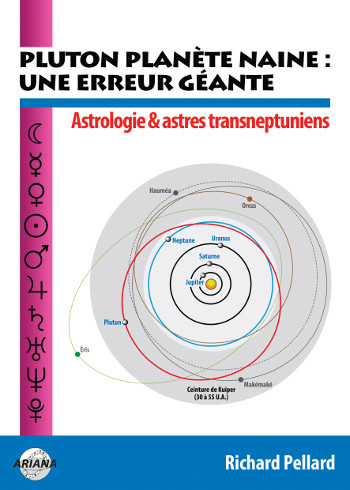
Pluton planète naine : une erreur géante
par
117 pages. Illustrations en couleur.
Pluton ne fait plus partie des planètes majeures de notre système solaire : telle est la décision prise par une infime minorité d’astronomes lors de l’Assemblée Générale de l’Union Astronomique Internationale qui s’est tenue à Prague en août 2006. Elle est reléguée au rang de “planète naine”, au même titre que les nombreux astres découverts au-delà de son orbite.
Ce livre récapitule et analyse en détail le pourquoi et le comment de cette incroyable et irrationnelle décision contestée par de très nombreux astronomes de premier plan. Quelles sont les effets de cette “nanification” de Pluton sur son statut astrologique ? Faut-il remettre en question son influence et ses significations astro-psychologiques qui semblaient avérées depuis sa découverte en 1930 ? Les “plutoniens” ont-ils cessé d’exister depuis cette décision charlatanesque ? Ce livre pose également le problème des astres transplutoniens nouvellement découverts. Quel statut astrologique et quelles influences et significations précises leur accorder ?
Enfin, cet ouvrage propose une vision unitaire du système solaire qui démontre, chiffes et arguments rationnels à l’appui, que Pluton en est toujours un élément essentiel, ce qui est loin d’être le cas pour les autres astres au-delà de son orbite. Après avoir lu ce livre, vous saurez quoi répondre à ceux qui pensent avoir trouvé, avec l’exclusion de Pluton du cortège planétaire traditionnel, un nouvel argument contre l’astrologie !
Téléchargez-le dès maintenant dans notre boutique